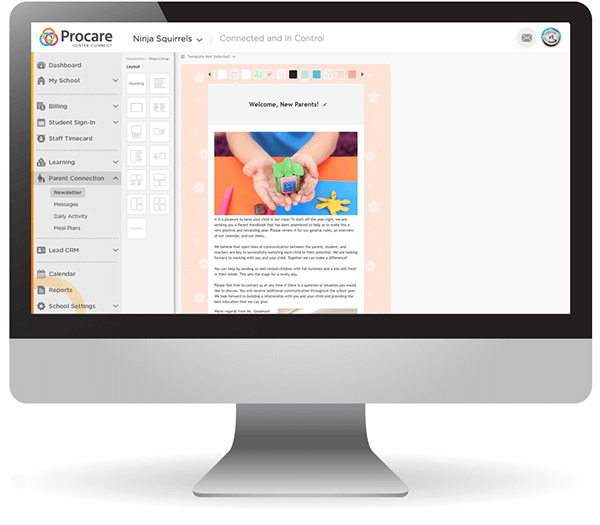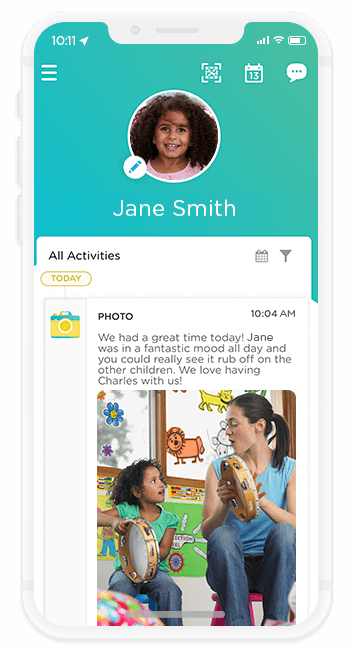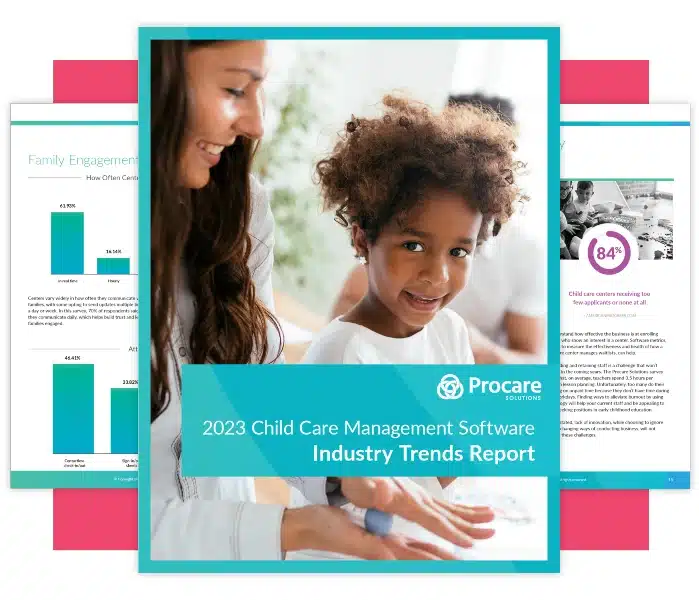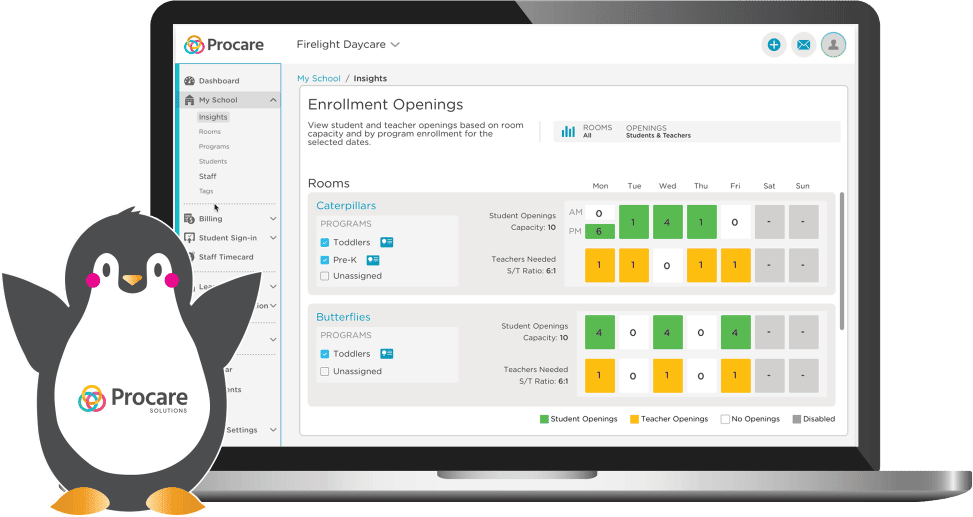
For child care centers, regular communication with parents is essential for maximizing child learning outcomes, keeping parents engaged in their child’s learning process, and increasing customer satisfaction and retention. Effective communication forms the basis for collaboration between parents and providers with the goal of connecting kids with the resources they need to reach their full potential.
Communication with parents is especially challenging during the coronavirus pandemic, where new policies and procedures will result in fewer opportunities for face-to-face communication. Child care centers must plan for this by adapting their communication strategies for digital media.
In this article, we share 10 parent communication strategies that child care centers can use to communicate more effectively with parents and cultivate stronger relationships in this new environment.
10 Parent Communication Strategies in Child Care
Build Trust with Parents
Child care providers should strive to build personal relationships of trust and caring with the families who patronize their centers. Parents are already placing their trust in your center by choosing to leave their children in your care; the actions taken by child care providers and administrators each day will determine whether that trust grows or diminishes over time.
To build trust with parents, child care providers can:
- Demonstrate their commitment to child health and safety
- Treat kids and parents with caring, respect and responsiveness in all interactions
- Keep promises and honor commitments
- Set an example for kids as a positive role model
- Exercise good and thoughtful judgment in all situations
- Anticipate and respond to problems before they snowball
These behaviors form the foundation of a trusting relationship with parents that ultimately leads to strong personal relationships and effective communication.
Connect with Parents on their Preferred Platforms

With face-to-face interactions limited by the coronavirus pandemic, communication between child care centers and their customers is moving online. To stay connected with families in this new environment, child care providers must engage and communicate with parents via email, SMS text messaging or a social media platform.
Centers should identify preferred communication channels for each family and take steps to connect with each family on their platform of choice. Centers can also ask families how often they like to receive communications, which types of communication are most important to them, and under what circumstances they might prefer one channel over another.
When parents can give their input on the communication process and share their preferences, they’re empowered with more control over how and when they receive updates. In turn, centers are positioned to communicate with parents at their comfort level and demonstrate respect for the unique needs and circumstances of each family.
Develop a Plan for Communicating with Diverse Families
Parents who speak a different language or who choose not to engage with digital technology for cultural reasons have the same interest in understanding their child’s progress and staying up-to-date with new developments at your center. Work to make special arrangements to communicate promptly with linguistically and culturally diverse families.
To accommodate families with diverse needs, you may choose to hire a child care provider that speaks the required language, hire a college student to supply translation services, or complete translations on your own using Google Translate. The latter is not ideal given the nuances of various languages, but it can help you in a pinch. In-person communication may be necessary — at a safe distance, of course — for families who choose not to engage with technology.
Whichever option you choose, remember that your goal is to make child care communications from your center equally accessible for all parents.
Be Flexible for Families with Limited Access to Technology

With child care communication moving onto digital platforms, families with limited access to technology will face significant challenges when it comes to receiving those communications in a timely fashion.
Child care centers and providers will need to adopt flexible communication strategies and go the extra mile to meet the needs of parents in these cases, including:
- Communicating by phone and setting aside time for scheduled phone calls with parents
- Meeting with parents in person to discuss their child’s progress and deliver updates
- Sending letters home with kids
Establish Shared Goals and Priorities with Parents & Families
Child care providers should make a point of asking parents about their goals, objectives and priorities for their child’s development. Parents can help child care providers understand each child’s individual history, strengths and biggest areas of opportunity for improvement. After establishing shared goals and priorities, parents and providers can team up to make a bigger impact on the child’s progress.
Soliciting feedback and input from parents in this way shows that child care providers are dedicated to meeting the needs of each child on an individual basis. Once parents and providers share common goals for a child’s development, child care providers can design activities to support those objectives or connect families with additional resources in the community.
Open Two-Way Communication Channels
Effective interaction between parents and child care centers means opening two-way communication channels where parents and providers are equally capable of initiating a conversation, sharing information and updates, and expressing any concerns about a child’s developmental progress.
Two-way communication starts when centers open the appropriate channels and invite parents to share their thoughts, feelings, questions and concerns with child care providers or administrators as needed. Frequent communication from parents gives your center the opportunity to assess the needs of parents based on their feedback and take the right steps to ensure their ongoing satisfaction with your program.
Send a Weekly or Monthly Newsletter with Program Updates

Your communication strategy with parents should include a weekly or monthly newsletter that keeps them informed about upcoming events, anticipated program closures, and other news or updates that impact your center.
Weekly newsletters should be distributed on Friday evenings, when parents are least likely to have work the next day. This gives parents the opportunity to look through your newsletter (keep it short and sweet) and get informed with the latest updates from your center while they’re feeling relaxed – and they’ll have the weekend to prepare their child for any special events scheduled during the coming week.
Use Mass Communication for Emergencies or Unplanned Changes
When an emergency situation or unplanned change impacts your child care center, how quickly can you communicate with parents and keep them in the loop? When your child care center fails to communicate urgent updates in a timely fashion, trust is broken and parents may feel hurt or betrayed.
Emergencies don’t always happen very often, but there’s extra risk here during the coronavirus pandemic – what if someone with COVID-19 enters your facility and you need to inform parents as soon as possible to protect your community?
Child care centers should create emergency response plans that include the ability to rapidly reach out to parents with mass communications when necessary.
Use Direct Communication to Share Positive News and Outcomes

Child care providers should regularly share positive news and outcomes with parents using direct messaging as a means of building rapport and forming a positive relationship.
Child care centers can use Procare’s child care app to share daily reports with parents, updating them on their child’s mood, sleep schedule, diaper changes, bottle times and other details. Providers can also share image and video content of kids participating in fun activities, achieving new developmental milestones and enjoying their time at the center. These features help parents stay engaged with their child’s learning and take comfort in the knowledge that their child is having a good day.
Sharing positive news with parents regularly also helps build rapport for the occasions when providers need to discuss concerns about a child’s development or work with parents to address behavioral challenges.
Collaborate to Address Concerns and Solve Problems from Three Perspectives
When child care providers are concerned about a child’s development or behavior, a positive relationship with their parents goes a long way toward finding a solution. Providers should approach these conversations with a collaborative attitude and the desire to understand all three relevant perspectives: parent, provider and child.
When parents and child care providers can work together in earnest to address a child’s development and wellbeing, kids get the support they need to overcome challenges, reach milestones and be successful.
Support Your Parent Communication Strategies with Procare Solutions

Adopting the right communication strategies in child care will enhance your relationships with parents, elevate parent engagement, and drive both retention and child developmental outcomes within your center.
With over 30 years in the business of child care, Procare Solutions provides the technology and support your center needs to excel at parent communication Ready to find out how Procare can help?





